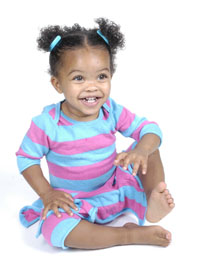by: Roxanne Quimby
Owner and Designer, happy greenbee, inc
http://happygreenbee.com/ With the frenzy of toy recalls in 2007, parents have started asking questions. Are any of their children’s toys safe? What about their kid’s bedding? Their clothes? Sure, lead-laden toys should obviously be out of a child’s reach, but it’s time to look more closely at all the things our children eat, touch, feel and wear in their everyday lives. Even ‘conventional’ cotton, once considered the natural fiber of choice, is no longer safe for our children. Organic cotton, on the other hand, is healthy for all our planet’s creatures, from children and wildlife to farm and factory workers.
With the frenzy of toy recalls in 2007, parents have started asking questions. Are any of their children’s toys safe? What about their kid’s bedding? Their clothes? Sure, lead-laden toys should obviously be out of a child’s reach, but it’s time to look more closely at all the things our children eat, touch, feel and wear in their everyday lives. Even ‘conventional’ cotton, once considered the natural fiber of choice, is no longer safe for our children. Organic cotton, on the other hand, is healthy for all our planet’s creatures, from children and wildlife to farm and factory workers. Before the 1950s, cotton-growing mainly involved sustainable techniques, but now cotton is one of the most environmentally damaging crops grown in the world, resulting in wide-scale water pollution, chronic illness in farm workers, and calamitous effects on wildlife. Conventionally grown cotton occupies only three percent of the world’s farmland, but uses 25 percent of the world’s chemical insecticides, including Parathion, which is at least 30 times more toxic that DDT! As insects develop pesticide resistance over time, farmers desperate to keep up yields often resort to genetically modified cottonseed and heavier and heavier cocktails of pesticide poisons. Ironically, less than ten percent of those chemicals actually accomplish their task—the rest are absorbed into the plants, the soil, the air, the water and eventually, our bodies.
Before the 1950s, cotton-growing mainly involved sustainable techniques, but now cotton is one of the most environmentally damaging crops grown in the world, resulting in wide-scale water pollution, chronic illness in farm workers, and calamitous effects on wildlife. Conventionally grown cotton occupies only three percent of the world’s farmland, but uses 25 percent of the world’s chemical insecticides, including Parathion, which is at least 30 times more toxic that DDT! As insects develop pesticide resistance over time, farmers desperate to keep up yields often resort to genetically modified cottonseed and heavier and heavier cocktails of pesticide poisons. Ironically, less than ten percent of those chemicals actually accomplish their task—the rest are absorbed into the plants, the soil, the air, the water and eventually, our bodies.
The solution to this problem is to go organic. Organic farmers rely on crop rotation, not chemicals, to maintain and replenish soil fertility. In order to meet international organic standards and obtain organic certification, a field must be pesticide-free for at least three years, and organic cotton farmers cannot use genetically modified cottonseed. Organic cotton has softer, longer fibers than conventional cotton, so the resulting fabric is softer, thicker, and more durable.
Organic cotton is especially great for infants and children. Whereas pesticide and chemically-treated clothing traps heat and prevents skin from absorbing adequate moisture—often causing rashes and eczema on sensitive skin—organic cotton is natural and breathable. Children with allergies particularly benefit, as organic cotton does not have the residual toxic residues that linger on conventional cotton. Even those without sensitive skin find organic cotton more comfortable and kid-friendly. The longer fibers stretch as children grow.
The best way to support organic cotton farmers is to use your consumer power wisely and support those businesses that make their products sustainable from the farm to the store. For example, Happy Green Bee—a company producing organic cotton playwear for infants and children—creates children’s clothing and accessories made with nontoxic dyes and no chemical bleaches or finishers. In addition, Happy Green Bee products are made in fair-trade-certified factories that are monitored for worker health and safety.
Whether shopping for kids clothing, sheets, blankets or personal care products, look for organic fiber products. Your children—our planet’s future—will thank you.
[Visit Happy Green Bee now.]
Thursday, April 17, 2008
Organic Cotton: For Our Children And Our Planet
Subscribe to:
Post Comments (Atom)





















1 comments:
For really sensitive skin its best to avoid color, fragrance and parabens in children bath time and skincare products.
This site is good - its lets you check out what ingredients are is well known childrens brands just in case they may trigger eczema or dermatitis
Childhood Eczema Help
Post a Comment